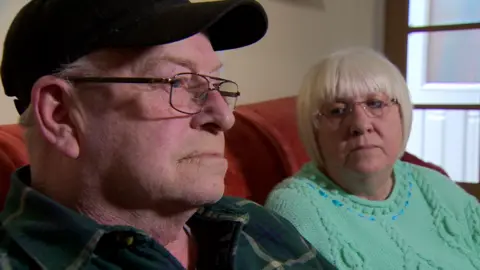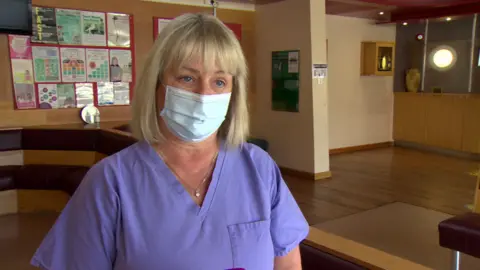GP telephone first system 'here to stay'
A phone first system adopted by most GP surgeries at the start of the pandemic is "here to stay", the Royal College of GPs (RCGPs) in Northern Ireland has said.
However, the RCGP has also accepted patient access needs to improve.
The system was introduced in spring 2020.
Retired couple Simon and Jean Clayton said they found the system impersonal and a hassle.
They live in Coleraine, County Londonderry.
Simon had a stroke a number of years ago, was diagnosed with bladder cancer in 2020 and Jean too has had health problems.
While they are now with a GP practice they are happy with - they said that in the past they have struggled with access.
According to GPs, the move, which was imposed by government and came without either consultation or prior information, was necessary to minimise the risk of infection of Covid-19.

But there is concern among some members of the public that the system is not working.
Speaking to BBC News NI on behalf of the Royal College of GPs (RCGP), Dr Ursula Mason accepted that the system wasn't working but said there were not enough GPs to see people.
She said the telephone system, which was being refined and "improved", was the best way to prioritise the sickest patients.
"The telephone system allows us to see many more patients, to deal with demand in a better way so I think the telephone system is here to stay," added Dr Mason.
"There will be some changes to upgrade it, but it will form a significant part of how we manage demand."
'A hassle'
Jean Clayton said she found the telephone system challenging.
"Being number 29 in the queue on the phone and then it would be about 4 o'clockish, knowing that they would close at 17:00 and you go right down to position three, two and then back to three and then it cuts off - gone for the day," she said.
"The physio suggested cortisone injections and so I came downstairs and asked the receptionist for an appointment and she said: 'You've got to phone me.'"
Her husband said he found the system impersonal.
"It just gets to the point when you are ill you just don't bother ringing up, because you just treat yourself. A lot of people are self-medicating because it's just so much hassle."
'Massive pressures'
Dr Laurence Dorman, RCGP NI chairman, said they were aware some patients are having "genuine difficulties accessing our services" and said more than 200,000 patients per week contact GP surgeries.
"It is very important to realise that there are massive pressures on General Practice in the same way as there are in emergency departments and right across our systems," he told BBC Radio Ulster's Good Morning Ulster on Wednesday.
Dr Dorman said he did not have "hard data about health outcomes" in relation to the phone-first system but said it was vital for the public to realise this was being done to "meet their needs".
"It is not a perfect system and unfortunately we had to do it at the start of the pandemic in response to infection prevention and control and to meet the needs of the protection from Covid, but there our new ways of working and we will be engaging positively with our patients on this."
The chief executive of the Patient and Client Council said that it wants a wider conversation about plans to make the phone-first system permanent.
Vivian McConvey told BBC News NI's Evening Extra programme that there has been a wide range of responses from patients.
"Some people are saying, 'you know, I haven't had a real problem with this service and it actually has suited me to be able to phone in', right through to other people at the other end of the scale feeling like this isn't working for me, I'm feeling very isolated from GP services."
'Several thousand calls'
Dr Mason's practice in Carryduff is used to taking several thousand calls daily.
While waiting areas are sparsely populated, inside the individual surgeries doctors take call after call.
Afternoons are set aside to see those people who have phoned in earlier and have managed to get a face-to-face appointment.
"We have seen huge problems with access over the years due the telephone system, that is the bottleneck for patients and it is frustrating for patients and GPs," she said.
"But we are taking steps to try and change and refine systems. But the bottom line is there are only so many patient contacts that GPs can deal with every day and when those finish we can then only offer an emergency service and that is regrettable."
Dr Mason warned that unless there was realistic funding GP services would be "limited in the future".
She said the college "accepts there are problems with the telephone system", but that it allowed GPS to see the sickest first.
"Part of the problem is that some practices have old phone systems that don't allow for patients to be placed on hold.
"It's not working and we are trying to fix it by upgrading phone systems and by changing how we work. But it is hugely difficult."

Meanwhile, 40 miles away in Armagh, Dr Frances O'Hagan juggled similar problems in the Friary surgery.
At most, two people sit in the waiting room, while others attend a treatment room.
In the past five days 1,012 people have been triaged by telephone, while 645 people have had face-to-face consultations with their GP.
There are eight phone lines into the building and for approximately eight hours every day the lines are constantly ringing.
Dr O'Hagan also admitted things could be done better, but said the telephone system was the safest way of treating patients during a pandemic.
"At the moment Covid is still with us and we must ensure patients are seen in the safest way," she added.
"We manage how they come into the building and we can't have people waiting in a crowded area."
200 calls a day
Meanwhile, Siobhan McDermott, a receptionist at a GP practice in Londonderry, described her typical day.
"The phone lines are starting from nine o'clock in the morning," she said.
"We have two girls here answering the lines - we could be taking up to 200 calls each a day and directing them to the right area by care navigating each call.
"So we're care navigators now more so than receptionists, which allows us to direct the patient to the right person that they need to talk to."
Across Northern Ireland, on the week ending 25 March, 74,267 people were treated in surgery and 117,182 by phone or video.
While RCGP NI didn't have comparable figures for before and after the new telephone system, GPs said they believe it was allowing them to treat more patients - but not necessarily face-to-face.
According to the Northern Ireland Statistics and Research Agency, Nisra, there were 321 GP practices in March 2021 - that is a reduction of 29 (8%) since 2014.
